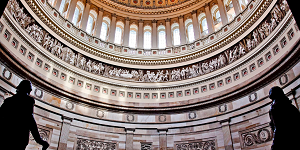Newsroom
NAFCU urges for House support of MBL relief
 NAFCU Vice President of Legislative Affairs Brad Thaler wrote to House leadership Wednesday to call for support for the bipartisan Access to Credit for Small Businesses Impacted by the COVID–19 Crisis Act, H.R. 1471. The NAFCU-sought legislation was introduced Monday by Reps. Brad Sherman, D-Calif., and Brian Fitzpatrick, R-Pa. and would provide a temporary exemption from the credit union member business lending (MBL) cap for loans made to small businesses as they recover from the coronavirus national emergency.
NAFCU Vice President of Legislative Affairs Brad Thaler wrote to House leadership Wednesday to call for support for the bipartisan Access to Credit for Small Businesses Impacted by the COVID–19 Crisis Act, H.R. 1471. The NAFCU-sought legislation was introduced Monday by Reps. Brad Sherman, D-Calif., and Brian Fitzpatrick, R-Pa. and would provide a temporary exemption from the credit union member business lending (MBL) cap for loans made to small businesses as they recover from the coronavirus national emergency.
In the letter, Thaler urged members of the House to support the bill and advance it as part of pandemic recovery efforts. Thaler also noted that the current “arbitrary credit union MBL cap serves as a disincentive for many credit unions to focus on small business programs.”
Specifically, Thaler noted, the enactment of the bill would “help encourage more credit unions to establish and enhance member business lending programs designed to help their small business members recover from the COVID-19 pandemic beyond the PPP.”
The bill would allow credit unions to exempt from their MBL cap loans made within the year from when the national emergency that was declared on March 13, 2020, expires to small businesses to aid in their recovery of the coronavirus pandemic. It would also require the NCUA to issue implementing regulations that ensure a credit union’s safety and soundness are not impacted by the loans.
Similar legislation was introduced in the House and Senate last year. NAFCU's advocacy rallied support from more than 60 members of Congress for this MBL relief to be included in coronavirus relief efforts.
The association has long sought relief for credit unions from the arbitrary MBL cap and, amid the coronavirus pandemic, has urged Congress to amend the Federal Credit Union Act to provide credit unions with greater flexibility and relief from the MBL cap so they can increase access to lending to the nation's small businesses that are in need. The association has also worked to garner support from the NCUA Board on this issue.
Read Thaler’s full letter. NAFCU will keep credit unions updated on the bill's status and continue to advocate to Congress ways in which it could provide additional tools to credit unions to better support members amid the pandemic.
Share This
Related Resources
Add to Calendar 2024-06-26 14:00:00 2024-06-26 14:00:00 Gallagher Executive Compensation and Benefits Survey About the Webinar The webinar will share trends in executive pay increases, annual bonuses, and nonqualified benefit plans. Learn how to use the data charts as well as make this data actionable in order to improve your retention strategy. You’ll hear directly from the survey project manager on how to maximize the data points to gain a competitive edge in the market. Key findings on: Total compensation by asset size Nonqualified benefit plans Bonus targets and metrics Prerequisites Demographics Board expenses Watch On-Demand Web NAFCU digital@nafcu.org America/New_York public
Gallagher Executive Compensation and Benefits Survey
preferred partner
Gallagher
Webinar
AI in Action: Redefining Disaster Preparedness and Financial Security
Strategy
preferred partner
Allied Solutions
Blog Post
Add to Calendar 2024-06-21 09:00:00 2024-06-21 09:00:00 2024 Mid-Year Fraud Review Listen On: Key Takeaways: [01:16] Check fraud continues to be rampant across the country. Card fraud is affecting everyone. [04:31] Counterfeit US passport cards are just another new toolbox in the bad actors’ toolbox. [07:21] Blocking the fallback is the only way to defeat counterfeit cards. [11:17] The best way is constant education to your members in as many channels as you can. [13:02] We are still seeing overdraft lawsuits. Make sure the programming you have at your credit union matches what you have displayed for the members. Web NAFCU digital@nafcu.org America/New_York public
2024 Mid-Year Fraud Review
Strategy & Growth, Consumer Lending
preferred partner
Allied Solutions
Podcast
Get daily updates.
Subscribe to NAFCU today.
